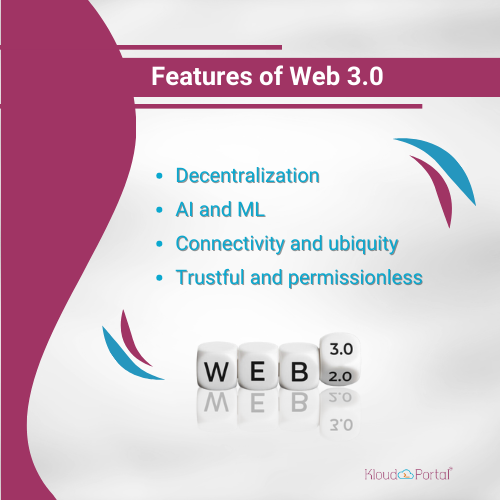Web 3.0, often called Web 3, is the next internet revolution. Web 1.0, Web 2.0, and Web 3.0 are the versions of the World Wide Web. It is a service used to access and retrieve data over the internet. Today, the term world wide web is redundant, and the new term ‘Web’ is used instead. Incidentally, we use the prefix www for the website URLs on the internet. All you require is an internet connection to get started.
Yet, what precisely is Web 3.0, how will it appear, and how will it change our lives? You’ve come to the correct place if you’re curious about the information above.
Evolution Of The World Wide Web
Web 1.0: The early web or the first version, Web 1.0, consisted of static web pages hosted on a server. Users could only access and consume data, and they could browse the static pages, but the interactive web was unavailable on Web 1.0. Web 2.0: The new era utilizes the current Web 2.0. Interaction is made possible with various web technologies like JavaScript, HTML, and CSS. A moniker for Web 2.0 is the ‘Social Web.’ Users can consume, generate content, and contribute to the web. A few examples of Web 2.0 are:- Social media platforms like Facebook, Twitter, and Instagram
- Web mapping services like Google Maps, Apple Maps
- Video Sharing Platforms like YouTube, TED, and Flickr
- Blogging services like WordPress, Tumblr, Blogger
- Podcasting services like Google Podcasts, Apple Podcasts, and Spotify
- Data breaches and poor lifecycle methods for monetization, especially with venture capital investments, have been a way of life with Web 2.0.
- Centralized control has given the authority to a single governance body that can take control of the user data to restrict them.
- User privacy has been a major concern. User data is compromised because there is no control over how it’s stored.
Features Of Web 3.0
1. Decentralization: Blockchain will help store data, applications, and services in multiple locations. Users are given more control because the data is distributed without a central authority, and their own data can be controlled. People can use a single personalized account for accessing their social media, email, or shopping accounts. Big Tech companies like Google, Meta, and Twitter will get lesser opportunities to exploit user information for marketing purposes. In other words, decentralization will establish trust in the virtual world. For instance, SaaS3 is a modern concept using Web 3.0 components and blockchain technology. SaaS3 may utilize decentralization with NFTs (Non-fungible tokens), DAOs (Decentralized autonomous organizations), or Cryptocurrencies. KloudPortal, the best digital marketing company, specializes in SaaS Marketing Services and provides India’s best enterprise SEO Services. 2. Artificial Intelligence (AI) and Machine Learning (ML): Web 3.0 leverages the power of AI to make the web more intelligent or enable it to process information with near-human-like intelligence. It is the next generation of the internet’s evolution. It can make internet data machine-readable through technologies based on the semantic web and natural language processing. It makes it easier to process user-generated content. 3. Connectivity and ubiquity: The internet will be accessible to anyone, anywhere, and anytime. Web 3.0 is ubiquitous because it is accessible through any platform or device. IoT (Internet of Things) will be launched on several smart devices and will not be limited to smart mobile devices or personal computers, thus improving internet connectivity. 4. Trustful and permissionless: A third party or an intermediary is not required for Peer-to-Peer (P2P) interaction. Permission from a central governing body is not needed in Web 3.0.Technologies And Online Services Of Web 3.0
Decentralized autonomous organizations (DAOs): DAOs are independent of centralized governing bodies like a central bank or government. They are collectively owned by a small group of leaders who act as a governing body. These DAOs share a common goal and provide services online. They depend on smart contracts, logically coded agreements executed between two parties, and run on blockchain networks. Decentralized finance (DeFi): DeFi is a financial system based on secure distributed ledgers. Peer-to-peer (P2P) cryptocurrency exchanges are possible with DeFi without third-party involvement. It uses blockchain technology based on distributed mechanism, and smart contracts are used as a consensus between the parties. Decentralized applications (dApps): dApps are anything like typical web applications but are run on a decentralized peer-to-peer network of computers instead of a single computer. They are decentralized because we need not access them from a single cloud location. Instead, they use Web 3.0, which makes the dApps decentralized. They offer security and privacy advantages that are not available in Web 2.0. Digital currencies and Non-fungible tokens (NFTs): Bitcoins are the new generation of digital currency and the best-known cryptocurrency. It is built on a decentralized peer-to-peer network and is independent of a centralized governance system or authority. Transactions can be done online without third-party intervention. Lucrative software engineer jobs are available in bitcoin and cryptocurrency technology. NFTs are digital assets with metadata and unique identification codes. They come in various forms, like online videos, music, games, etc. They can be bought and sold online more commonly, along with cryptocurrencies, and they are built with the same technology. Metaverse: Metaverse is a virtual reality space used to connect and interact with their peers based on augmented reality. It’s a virtual world wherein users use 3D avatars to represent themselves in connection with social media sites and platforms.
Web 3.0: Why It Is The Future Of The Internet?
Web 3.0, also called the internet’s future, fills the loopholes like monetization and security and privacy issues faced with Web 2.0. Its goal is to create a decentralized internet in the tech world. Since it is built on blockchain technology and leverages artificial intelligence (AI) and machine learning (ML), it adds an extra layer of security with no central oversight.
Web 3.0 will be more than just a marketing buzzword in the coming years. Web 3.0 business models will accrue and prove the real value of the same. Big tech companies like Twitter emerged in trying to incorporate Web 3.0 technology into the social network.
Major tech giants like Meta (previously Facebook) and Amazon foresee the advantages. They are investing in web 3.0 and adapting to it. Small businesses must focus on web 3.0 to communicate and collaborate with customers in the newest possible methods.
Web 3.0 can also help with the search issues that the current web has. By recognizing the decentralized context, machine learning and natural language processing can help in the discovery of more pertinent content.
Best Enterprise SEO Services In India
KloudPortal, the best Digital Marketing Company in Hyderabad, provides India’s best Enterprise SEO Services. Rank your enterprise higher for the list of products and services through a comprehensive SEO Strategy. Our team of experts understands your enterprise’s needs and preferences. Our offerings include SaaS Marketing Services that help you gain qualified leads and improve your business growth. Contact us soon and explore our services.

Chaitanya Kummamuru
About The Author…
Chaitanya Kummamuru is from the wonderful city of Hyderabad which is the capital of Telangana state in India. She is a Software Engineer with good work experience in testing and development, and has a ‘Bachelor of Technology’ Degree in ‘Electrical and Electronics Engineering’. As an ardent reader she developed an interest in building her vocabulary and also a penchant for writing. With this mindset she wanted to explore content writing. She is a very dedicated individual with regards to work and has been a high performer.

